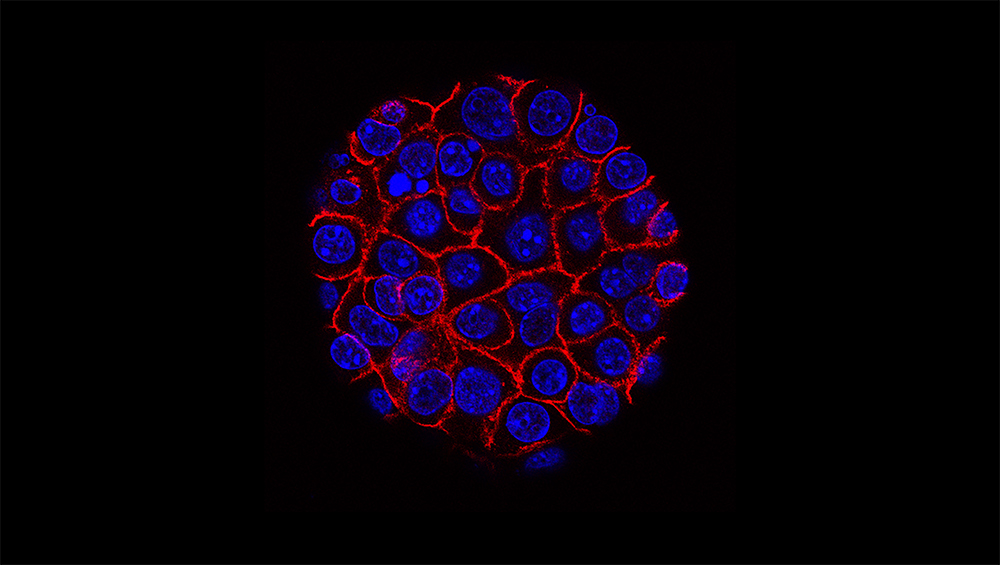Experimental Drug Boosts Immunotherapy Effectiveness in Pancreatic Cancer in Mice

Posted in News Release | Tagged cancer, immunotherapy, pancreatic cancer
WASHINGTON (November 4, 2021) — An experimental drug enhanced the benefit of an immunotherapy to fight pancreatic cancer in mice by increasing the number of immune cells in the immediate vicinity of the tumor, leading to a reduction in tumor growth, and in some mice, eliminating their cancer. The findings, from researchers at Georgetown Lombardi Comprehensive Cancer Center and BioXcel Therapeutics, Inc., provide early evidence that the drug could jump-start an immune response against pancreatic cancer, a disease that has so far been resistant to immunotherapy.
Media Contact
Karen Teber
km463@georgetown.edu
The data come from experiments of BXCL701, an experimental dipeptidyl peptidase (DPP) inhibitor developed by BioXcel Therapeutics, and appear in the Journal for ImmunoTherapy of Cancer on November 4, 2021.

“This combination treatment not only cured some mice but also demonstrated having instilled an immune-cell memory, so that when the cured mice were injected with cancer cells months later, the immune systems in 10 of 13 mice recognized and killed the cancer cells, leaving the mice cancer-free again,” says Allison Fitzgerald, PhD, at Georgetown Lombardi and co-first author. “If this result holds true in humans, it means the therapy may have the potential to offer long-lasting remissions for patients with pancreatic cancer.”
The National Cancer Institute estimates there will be 60,430 new cases of pancreatic cancer diagnosed in 2021 with an estimated 48,220 deaths. Only about 10 percent of pancreatic cancer patients live five years or more, making it one of the deadliest cancers.
The microenvironment surrounding most pancreatic tumors is very effective at blocking immune system attacks, so researchers turned to BXCL701. The drug candidate has been observed to help boost the effectiveness of immunotherapies in some early-phase clinical trials. (Research directed to evaluating the compound’s ability to promote immunotherapy in preclinical models was sponsored by BioXcel Therapeutics, Inc. through a research agreement with Georgetown Lombardi).

“While our success in mice is promising, we hold out additional hope due to the benefits of this DPP inhibitor seen in other types of cancer,” says the study’s corresponding author Louis M. Weiner, MD, director of Georgetown Lombardi and director of the lab where the research was conducted. “What we found to be unique in our study was how this drug candidate seems to enhance the effectiveness of immune response in pancreatic cancer, which is remarkable as standard immunotherapies have been unsuccessful to date.”
Scientists studied two sets of mice that were injected with cells that closely mimic human pancreatic cancer. The mice were then given the immunotherapy, along with BXCL701. The combination of therapies enhanced immunotherapy effectiveness by boosting two key immune system components: T cells and natural killer cells. Investigators found that natural killer cells contributed importantly to longer survival.
Natural killer cells play a key role in an immune defense against cancer in two ways: they recognize and kill cancer cells directly, similar to T cells, but also release small signaling molecules that can influence and regulate other parts of the immune system. Investigators believe that, based on this and other research, many immune cell types work together to keep cancer cells at bay.
“We would like to conduct additional studies in mice to better understand the biology of why this treatment is working so well and how we can make it work even better,” says Fitzgerald. “We are also hoping to develop a clinical trial based on the results of this study to see if this combination treatment works as well in humans as it does in mice.”
In addition to Weiner and Fitzgerald, the other authors from Georgetown include Shangzi Wang, Annie Zuo and Sandra A. Jablonski. BioXcel Therapeutics, Inc. authors are Veena R. Agarwal, Eugene Zhukovsky, Shubhendu Trivedi, Dimple Bhatia and Vince O’Neill. Additional authors include: Emily F. Marcisak, Melanie Loth and Elana J. Fertig, Johns Hopkins University, Baltimore, MD; and John MacDougall, formerly of BioXcel Therapeutics, Inc..
Weiner received research funding for this work from BioXcel Therapeutics, Inc. Additional disclosures include: Celldex (stock options and honoraria for scientific advisory board), CytoMx Therapeutics (stock options, compensation and travel reimbursement for scientific advisory board), Jounce Therapeutics (member, Founders Advisory Board and paid chair, Clinical Advisory Board), Immunome, Inc., (stock options for scientific advisory board), Tessa Therapeutics, (paid scientific advisory board member), and Samyang Biopharm USA, Inc. (paid advisor).
The research was also supported by NCI grants CA50633, CA51008 and F30 CA239441; a Lustgarten Foundation grant; and an Emerson Collective grant. Georgetown Lombardi Comprehensive Cancer Center Shared Resources were supported by NIH grants P30-CA051008 and S10OD016213.
